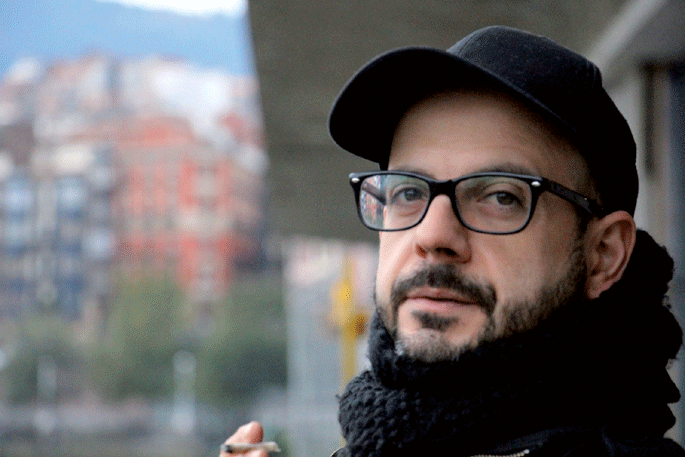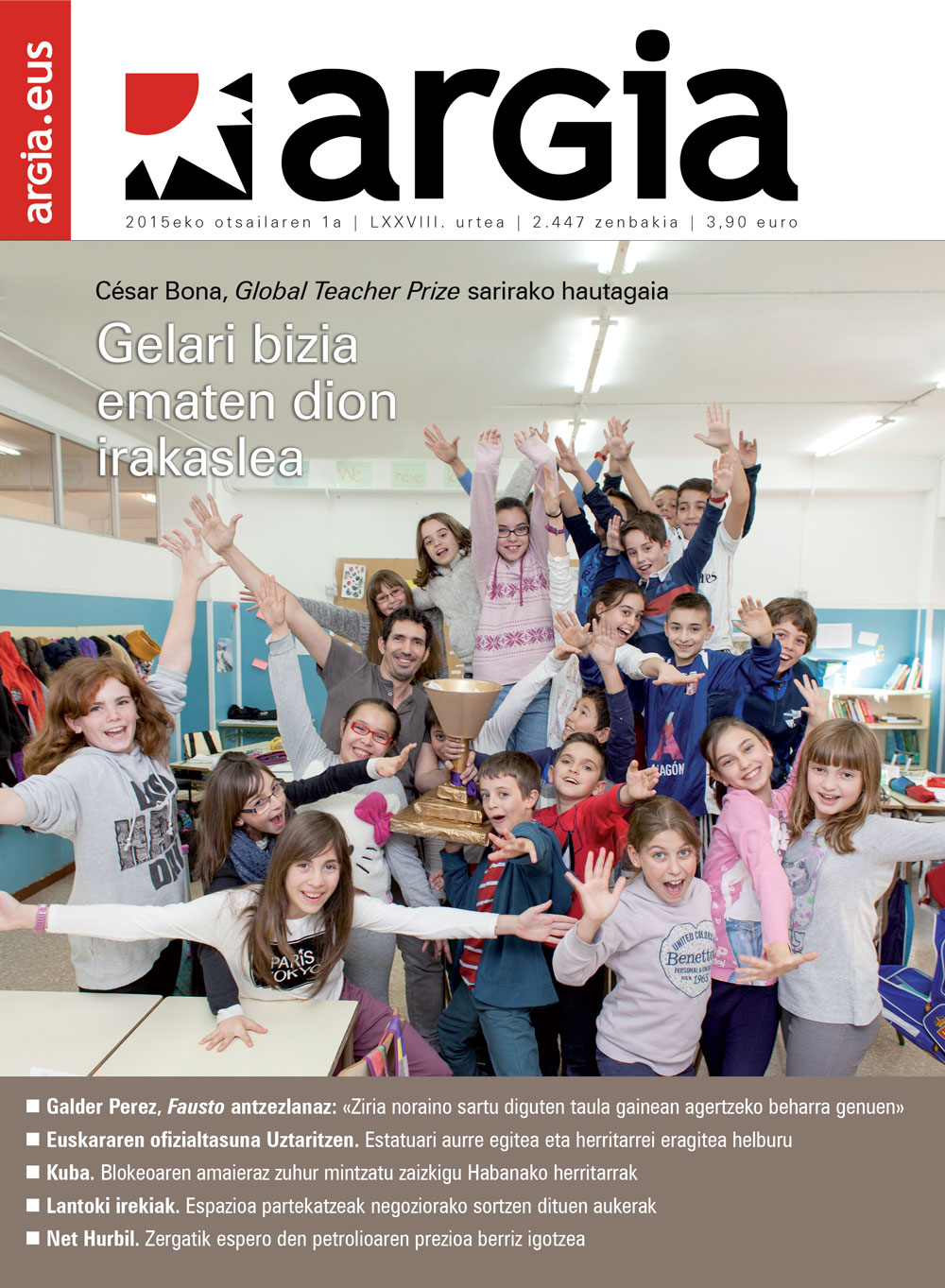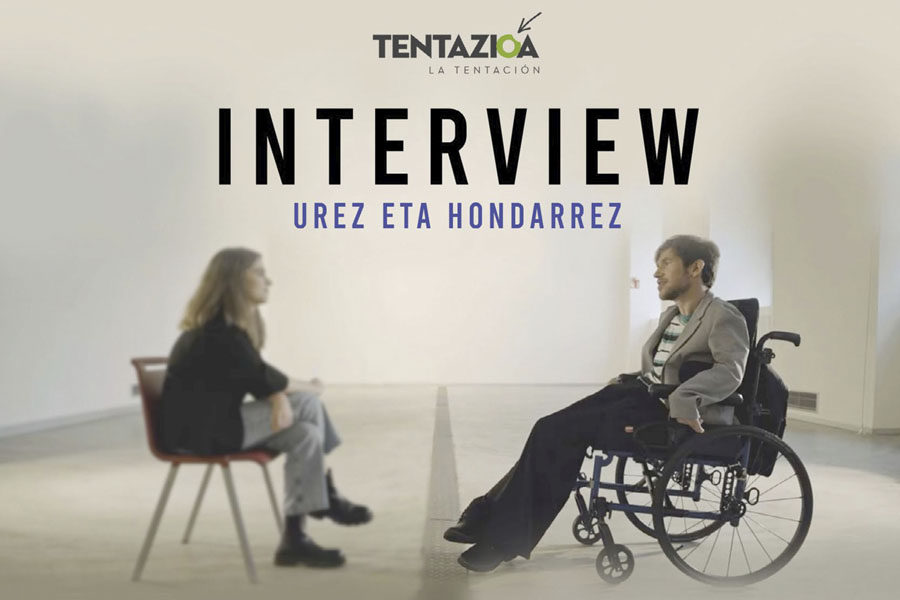"You, I, and we are all Fausto.
- In his latest work, Galder Pérez proposes to enter the skin of Fausto, a classic character that has a lot to do with it. Fausto, an exemplary citizen. The play, which was created in the laboratory of the creation of Pavilion 6 of Bilbao, will also be premiered in Basque on January 29 at the Main Theatre in the Guipuzkoan capital, within the program Korrika Kulturala. Translation by Fredi Paia. Director Galder Pérez has been surprised in the essay, nervous about the latest touches.

Tell me how the birth of the Fausto theater play has been, how the idea emerged and how it has been developed.
The project arises from the confusion between desire and needs. Lander Otaola, Mikel Losada and I had long been eager to update a classic text, and after several games and essays with Marlowe's Fausto in recent years, last year we were in the 6th place. The conditions and the opportunity came to stage what we dreamed of in the pavilion. Hence the enthusiasm. And the need, because we want to tell how we see, understand and feel the world that we live in today and that sucks, because we had the need to appear on the table that has deceived us how far.
We are referring, therefore, to the false fable that we live in European society and to democracy, which is its queen. Democracy is the best told and built story. And it seems that we really like this slippery, contagious land that we tread; the lie that we believe every day is so big and obvious ... And meanwhile, as in the story, we are doomed to live as if we were free in the so-called welfare society.
All this has been possible thanks to a utopian community of theatre and music, the needs of creativity and the desire to count. This is how the project developed. We start from the text and its adaptation. Then, with the participation of all, in such a heterogeneous group, each of us gave us everything we could.
In the Technical Sheet, luxury, there are several creators who are currently dedicated to the Basque theatre.
Many disciplines are mixed together in the project. Regarding the text, the C of the 16th century. The Fausto de Marlowe arranged it between Mikel Losada, Lander Otaola and the three, and then Fredi Paia translated it into Basque. As for rap, they are by Endika Lahaine, who plays them live. Together with him, four actors act on the stage: Mikel Losada, Miriam K Martxante, Lander Otaola and Diego Pérez. As far as music is concerned, the production has been from Maisha Mc, and the DJ also acts live in the performances. The sound has a great presence throughout the show, as not only the music, but also the sounds and noises set each scene. Sound is a vibration; although actors do not touch viewers, sound penetrates through the surface of the viewer and the listener through the tremor. That is what we have addressed. Through images, on the other hand, the obtained through words and sounds is accentuated: Zigor Gorostiola has made a spectacular design with lights and projections that have created a dark, street and wild environment. To this must be added the movements of the actors: on the one hand, the unraveling and barbarism that we live in the bowels, and, on the other hand, the elegance and greatness that they want us to believe.
It was created in the P6 laboratory, first in Spanish, and then the Basque version has arrived. Are they similar or do they each have their nuances?
The background is the same, because what we want to tell is universal, forgiving, Western. Therefore, the kick is received in the same way, regardless of language. But every language has its nuances, of course. I would say that the one we are working on in Euskera has more odor of incense... It is for all that our language, and perhaps our people, has given, received and suffered in the porch. I think that Euskera is also more fun. We are not so used to listening to classical texts, Baroque words and phrases, and the game between the berorika, the zuka and the Hitan is more evident, the contrast between the cult and the bourgeois language... And also for some of the references we have added to it, perhaps the text in Euskera is closer to its scope, that is, the public, even if it is not said in the whole work, will place the action of the work in the Basque Country itself.
Are the actors themselves acting on the stage in Spanish or in Euskera? Does this mean that more theatre can be produced in Euskera, that there is raw material for it?
In this case, we set out to create in Spanish, but in that initial creation work we already talked a lot about in Basque. I have a relationship with most members of the work team every day in Euskera. So while we were working, we felt like we needed to make a Basque version. For Diego, this is his first job in Euskera, and he's doing very well.
There is a lot of raw material to create in Basque, there is also level and desire. But the audience? Maybe that's what we need. Lately I have more interest in the theater in Euskera, I don't know if it's desire, it's imagination or it's reality. In any case, I believe that a distinction must be made between production and creation. Creators do not produce and very few producers... In a worthy cultural model, we would talk about production naturally, but I believe that the Basques create more than produce. There will also be things to learn...
What was Fredi Paia's work like?
Great! Fredi has already shown his desire to translate the text into Basque since he saw the Spanish version. He has done a great job. It is not an easy text, because, as I say, it is very baroque, there are a lot of confusions of treatment and, being honest and regrettably, we are not so accustomed to this kind of text in Basque. We, of course, do not want to frighten the public, on the contrary. Actors have to reach the listener. One of the main challenges of the text was to find and maintain this balance. He also told us that he enjoyed very much at work, and thank you! It was a very nice, unusual challenge in our house. From the very first moment I read the text, I saw that it kept the nucleus in which we wrote and laughed at it. Fredi is very good singing bertsos in the plaza, we already know, but in a classic text in cultured language, in addition to maintaining the tone of grandeur he needs, he has shown that he has the ability to get nice exits.
Are we all a little Fausto? Do we all want to be an exemplary citizen? Be part of that comfortable life?
In the play, we say that we live in the freedom of what prison is and what we call a system. We all give our permission to survive in these conditions every day, in one way or another. We are lost between fog in the capitalist, heterosex-patriarchal system, peppered with false values, in an economicist model where people's senses have no place. We all know this and we follow it, as if nothing happened. Hence comes all the sadomaso aesthetics of the work, which conquers us with erotic and lust, and we assume the beating, we enjoy it. The worst thing is that sometimes we protest, but in the end they always return to the same shit.
Fausto has had several versions throughout history, and has been taken up by several authors in his own way. What is the origin of our Fausto?
Our starting point is a text from the end of the sixteenth century written by Christopher Marlow. The one of Goethe is the best known, and although it is the myth, the one of man who sells his soul to the devil, we liked the one of Marlowe, it seemed to us that it also had a great present of content and structure... Although the structure has been respected, the scenes offer more gaming possibilities, there are more satire and more comedies. We have turned the classic around and, although it seems paradoxical, in part we have wanted to leave it.
How would you describe the Fausts that are circulating in the streets today?
It's you and I, we're all Fausto. Our protagonist, Jon Fausto, is going to make the way in politics, because the responsibility of politicians in this great trap that we live every day is very evident. But Fausto is not the politicians, the bosses or the ones who raise the most money, but the model citizens that we make it possible for that to be sustained: what is mortgaged, what is housed, what has children, what purchases a new car... All prisoners. In a vicious circle, we can't leave, we repeat it over and over again, we sell our soul every day to demonic democracy, so we're all Fausto.
Iruñea ez da oso handia, baina Beñat Iturbek elkarrizketarako lekua hautatu duen arte ez dut jakin institutu berean ikasi genuela. Madril eta Iruñea artean bizi da, han hemen baino gehiago, oraingoz. Etxera egin duen bisita bat probestu dut harekin... [+]
I'm talking about Interview. With water and sand
Authors: Telmo Irureta and Mireia Gabilondo.
The actors: Telmo Irureta and Dorleta Urretabizkaia.
Directed by: Assisted by Mireia Gabilondo.
The company is: The temptation.
When: April 2nd.
In which: At the Victoria Eugenia... [+]
ERREALITATEAREN HARRIBITXIAK
Nork: Josu Iriarte, Nerea Lizarralde, Jare Torralba eta Amets Larralde. Mikel Martinezek zuzenduta eta Jokin Oregiren testuetatik abiatuta.
Noiz: otsailaren 21ean.
Non: Bilboko 7katu... [+]














